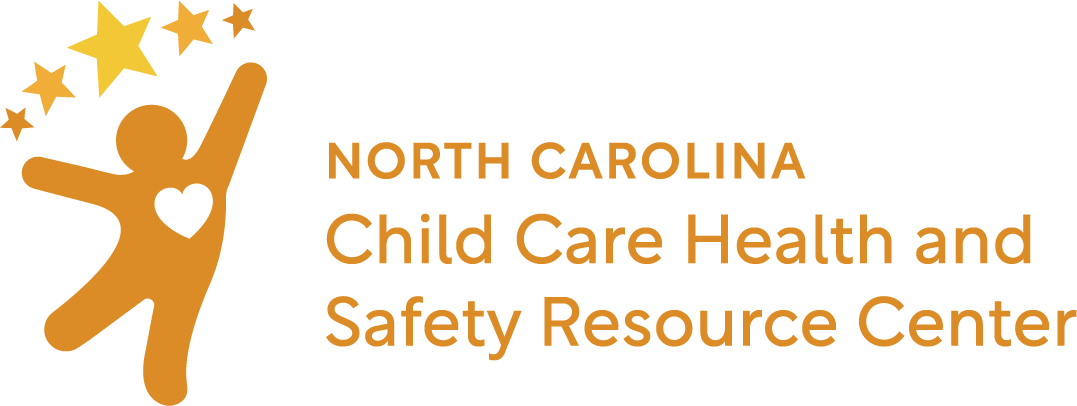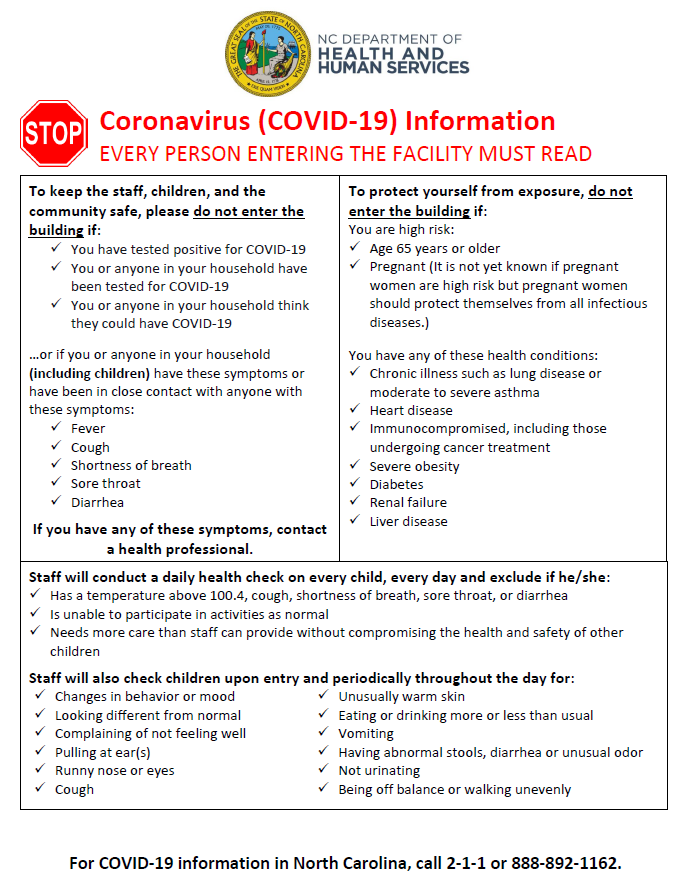New! You may now subscribe to our posts by clicking on the Follow button on the upper right side of the screen.
According to guidance from DCDEE, only children and staff who are needed to maintain ratio should be in classrooms. In order to limit the chance of COVID-19 spread:
- Have parents drop off children outside the classroom. Staff should meet children as they are dropped off.
- Have someone posted at the entrance to talk to staff and families who are entering the building about their symptoms.
- Conduct a Daily Health Check, upon arrival, every day, for every child – and periodically throughout the day. During the COVID-19 outbreak, taking children’s temperatures during the day is another sensible precaution.

In addition, ask staff and parents of the children entering the building if they or their child is experiencing:
- Fever (temperature of 100.4 degrees F or higher)
- Cough
- Shortness of breath
- Sore throat
- Diarrhea
Exclude both staff and children who are experiencing any of these symptoms or have been in close contact with anyone with any of these symptoms.
As an additional measure, some early care and education programs are using thermometers to check for fevers, in addition to interviewing staff or families about symptoms and whether or not they have taken fever reducing medication in the last 24 hours.
Which kind of thermometer
We recommend, considering Caring for Our Children standard 3.6.1.3 and after consultation with medical professionals with the Division of Public Health, that during the COVID-19 outbreak:
- Do not take oral (under the tongue) temperatures using a shared thermometer. The coronavirus that causes COVID-19 is most contagious through respiratory droplets coughed, sneezed or breathed out of the mouth. Even with a disposable cover that is changed between individuals, if a droplet gets on the handle it could pass from one person to another.
- Infrared (touchless) thermometers are ideal for use during the COVID-19 outbreak, as they allow multiple temperatures to be taken without the thermometer touching individuals.
- Tympanic (ear) thermometers are an option for children four months and older. However, while a tympanic thermometer gives quick results, it needs to be placed correctly in the child’s ear to be accurate and the presence of ear wax can cause the reading to be incorrect.
- Digital axillary (under the arm) and temporal (forehead) temperatures are less accurate, but are a good option for checking for fever in child care settings.
However, thermometers are in short supply and difficult to find in some areas. If an appropriate thermometer for use during the COVID-19 outbreak is not available for purchase locally or online, you can:
- Ask the family or legal guardian to fill out and sign a form that reports their child’s temperature as taken at home (or affirming the child does not have a fever) and any symptoms.
- Contact your Local Partnership for Children or Child Care Health Consultant and let them know of essential items you are unable to obtain. They may be able to coordinate with local resources about options that might be available.
Protecting staff who are performing checks during drop-off:
To protect the person posted at the entrance to the facility, consider one or more of the following suggestions:
- Have the person posted at the entrance maintain a six-foot distance from individuals as much as possible – use tape on the floor to delineate the space.
- Use a touchless thermometer if one is available.
- Have parents, family members or legal guardians bring a thermometer from home to check their own child’s temperature at drop off
- If using the facility’s thermometer:
- Do not take oral (under the tongue) temperatures because of the risk of spreading COVID-19 from respiratory droplets from the mouth.
- Let the parent or staff pick up the thermometer and take their own temporal / axillary or tympanic temperature on their child or themselves.
- Use disposable thermometer covers that are changed between individuals.
- Clean and sanitize the thermometer using manufacturer’s instructions often, and between uses if disposable covers are not available.
- Wash hands or use hand sanitizer between direct contact with individuals.





